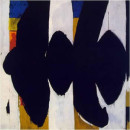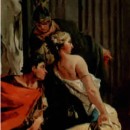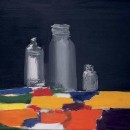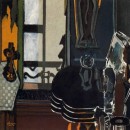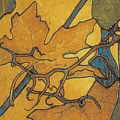The Death of the Goddess
Knowing my interest in Indian literature, Professor Hogan has kindly sent me a copy of his long poem entitled The Death of the Goddess. (1) The author’s Preface explains why the poem was written – it’s had a long gestation – and an Introduction by Rachell Fell McDermont provides an apt summary of the story and its themes. Let me first say something about the style. As can be seen below, the verse is clear, exact and made more compelling by its neutral tone. It doesn’t rise to commanding heights, or exult in memorable phrases, but doesn’t have to. Here is one of the more scatological sections (Shiva is speaking about a woman encountered on the battlefield, unnamed but possibly a Kali-like incarnation of Little Mother: canto 9): She had stripped off the outer breast-plate and leggings of her...
Read MoreAnthologies 4
I have been looking at Modern Poetry selected and edited by Maurice Wollman (The Scholar’s Library: Macmillan, 1939), an anthology in which some of the big names of Modernism start appearing – W.H. Auden, T.S. Eliot, Thomas Hardy, D.H. Lawrence, Stephen Spender and W.B. Yeats. In general, however, whatever the claims of the Introduction, the anthology is not Modernist in tone, and the poems representing the six above are not perhaps what we’d choose today. W.H. Auden is represented by: From Scars where Kestrels Hover T.S. Eliot is represented by: The Journey of the Magi* The Hollow Men* Thomas Hardy is represented by: Any Little Old Song I Am the One* Snow in the Suburbs* The Selfsame Song Weathers D.H. Lawrence is represented by: Baby Tortoise Cypresses* Humming-Bird Stephen Spender is represented by: I Hear the Cries of Evening...
Read MoreAnthologies 3
Poems in my next anthology are also arranged by theme, if a little vaguely, but there the similarity ends. Modern Poetry selected and edited by Maurice Wollman (The Scholar’s Library: Macmillan, 1939) is aimed at the academic market, and indeed my copy comes from a university library. The editor was the Senior English Master at the Barking Abbey School, and we can hear the schoolmaster’s sobriety in the Preface: The aim of this Anthology is to be representative of the poetry of the last dozen years. No poem, however, has been admitted for the sake of representing its author: each poem has been judged solely on its merits. The collection is an all-British affair (if we include Ireland). A few poets are missing because they had published little over the period in question -AE Housman, Robert Graves, Hilaire Belloc,...
Read MoreAnthologies 2
Decades ago, when I had more time at my disposal, I would spend hours in that most dispiriting section of second-hand bookshops: the poetry shelves. How much loving care had been lavished on collections that remained just worthy items, neither really good nor really bad, but simply a monument to others’ hopes, expressions and ambitions. Readers of the last blog will know that I’m looking at ‘Verse of Our Day: An Anthology of Modern American and British Poetry’ edited by Margery Gordon and Marie B. King, and published by D. Appleton and Co. in 1931. And one of the reasons now is as it was decades ago, to see if there exist important poets that have remained overlooked, perhaps not making our literary histories because of unfashionable style or subject matter. So what’s the verdict: are there unsung heroes...
Read MorePoetry Anthologies
We often view past poetry through the spectacles of our current conceptions, and it’s therefore salutary – indeed enlightening – to see how previous generations saw matters. I’ve been reading some old anthologies purchased cheaply on line through Abebooks, and will spend the next few posts discussing what’s come to light. Here, to start with, is ‘Verse of Our Day: An Anthology of Modern American and British Poetry’ edited by Margery Gordon and Marie B. King, and published by D. Appleton and Co. in 1931. The anthology is divided into 19 sections, and to give the flavour of the work generally and without distortion I’ll reproduce the first stanza of the first poem in each of the first six sections. 1. Nature Softly along the road of evening, In a twilight rim with rose, Wrinkled with age, and drenched...
Read MoreHegel and the Romantic Movement
First I should apologize for the long interval from my last post, which has been spent in converting, rewriting and updating web-pages to free pdf ebooks: Verse Writing, Literary Theory, A Background to Critical Theory, amounting to a rather unbelievable half million words, all available from Ocaso Press at http://www.ocasopress.com. Now to the post. I have been reading Jerry Muller’s admirable book on the origins of capitalism, or rather how capitalism has been analyzed, defended and extended by generations of European thinkers. {1} In his chapter on Hegel, Muller identifies the Romantic notion of freedom, which plays a large part in Modernist and Post-modernist writing. He says: ‘In this Romantic conception, freedom is measured by ‘the extent to which it diverges from what is universally acknowledged and valid and manages to invent something particular for itself’. That divergence from...
Read MoreThe Poetry of Academe
Through academic courses, literary criticism, MFA programs and support for the small presses, the universities play a critical role in today’s serious poetry. But what is it about academe that produces such indifferent poetry – generally mundane reflections on subjects that would not merit inclusion in a local newspaper? I’m not going to name offenders, but if the later selections in the Oxford Book of American Poetry {1} are anything to go by, the art form is now in a bad way. Perhaps it’s the politics, what commentators on 100 Reasons NOT to Go to Graduate School, expressed as: There are certainly kind and decent people in academia … most definitely. But this post is spot-on. With everyone working on (practically) lifetime appointments and nothing other than grad students and relatively meaningless awards and publications to hold over one...
Read MoreThe Contemporary Poem
The Contemporary Poetry Review {1} had an useful essay on the typical American contemporary poem a while back, which began with the question everyone hates to answer: When I tell people I teach and – God help me – even write poetry, they often say, “I wish you could explain modern poetry to me. I just don’t understand most of it.” Reviewing work published in the New Yorker, Jan Schreiber observes that today’s poem is commonly: * Unmetered and unrhymed. * Focused on a particular event. * Possessing slightly fantastical details, but not incomprehensible. * Inviting metaphoric or symbolic interpretation. * Reducible, with some ingenuity, to a statement, though not a simple one. * Inconclusive in its ending. Readers pointed out that New Yorker selections reflect the editors’ tastes primarily, that the examples illustrated weren’t too mind-blowing, and that...
Read More4 Poets in The Wolf Magazine
The Wolf Magazine is a forward-looking British magazine that publishes translations, criticism, book reviews, interviews and poetry that is difficult to categorize, but could be called commendably oblique to the usual viewpoints. Let me say more by commenting on Jonathan Morley’s On first looking into Cecily Jones’s Engendering Whiteness, which can be read at: http://www.poetrymagazines.org.uk/magazine/record.asp?id=21824 I’d better start by explaining that the book Engendering Whiteness is an extended academic study comparing the positions of white women under colonialism in 1627 Barbados with 1865 North Carolina, {1} and that ‘haint’ is a ghost or lost soul. That women are all sisters under the skin is given us in the opening lines: Beneath your skin, my dear, lurks a black haint with horny breasts, prouder nipples than yours. But the sisters are lustful, rebellious, given to dancing and drumming about their...
Read More5 Poets in The Seventh Quarry
The Seventh Quarry Swansea Poetry Magazine publishes work from around the world, a book and magazine review, and a profile of a British or a non-British poet with each issue. There is also poetry evening held regularly at the Dylan Thomas Centre in Swansea. I’ve chosen five pieces that work well, though they’re admittedly not over ambitious. The first is Even the black cow by Mike Jenkins at: http://www.poetrymagazines.org.uk/magazine/record.asp?id=19619 It’s a simple piece, reminiscent of the early Ted Hughes, but without his compelling imagery. The first four lines give its flavour: Even the cow gets tired of the crows on its back crows on its back picking flicking flapping The next is Royal Command by Herbert Williams at : http://www.poetrymagazines.org.uk/magazine/record.asp?id=19643 It maintains an easy command of the colloquial through its fifty odd lines, starting with: Evenings...
Read More5 Poets in Poetry Wales
It’s difficult to be enthusiastic about Poetry Wales, which publishes unsentimental reflections on things not made poetry by craft, treatment or inherent subject matter. The outlet makes the usual claims: Founded in 1965, Poetry Wales is a quarterly magazine with an international reputation for excellent poems, features and reviews from Wales and beyond. Emerging from a rich bilingual culture, Poetry Wales explores the diverse perspectives of Welsh poetry in English and its international relationships. Only three issues are available online at the London Poetry Library (the latest being 1993), the two recent specimen poems (by Damian Walford Davies and Emily Toder) are pious pretense, and the website archives give reviews only of poetry collections — conscientious no doubt, but not making us rush off an order for the works in question. Let me try to say what I mean...
Read More5 Poets in Poetry Scotland
Poetry Scotland is an unpretentious poetry magazine with a strong local flavour. As its ‘About’ page cheerfully announces: We aim to publish any kind of poetry so long as it is good. We have included rhymed and unrhymed, long and short, political and personal, humorous, narrative, ballad, haiku and prose poems. Our interest in languages (especially those of Scotland) brings Gaelic, Scots, Welsh & French to our pages at times. The magazine hosts an annual weekend of poetry in the highland town of Callender where friends, subscribers and contributors to Poetry Scotland can meet, listen to poetry and talks, take part in readings and discussion on a free and informal basis. Its website (The Open Mouse) is at: http://www.poetryscotland.co.uk/ and includes a short bio with its contributors’ poems. David Anthony’s Late August at Hadrian’s Wall is at: http://www.poetrymagazines.org.uk/magazine/record.asp?id=19075 And...
Read More





